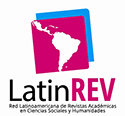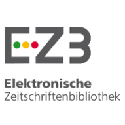The Legitimation Code Theory (LCT) applied to the regionalization exercise: analysis of a teaching and research instrument
Abstract
Starting from the premise that the exercise of regionalization can constitute a powerful starting point for creating analyzes that allow creating questions of a geographic nature, this study aims to present a tool that allows monitoring and evaluating the intellectual movements used by learning subjects in a context of teaching. To pursue this objective, we resort to the Theory of Legitimation Codes (TCL) proposed by Maton (2014), specifically with regard to the semantic dimension. Therefore, the constructs of density and semantic gravity are presented to create a model applied to the regionalization exercise. Density and semantic gravity are, roughly speaking, parameters for measuring the quality of appropriation of scientific concepts (density) and the possibilities of generalizing these concepts (gravity). After creating a semantic gravity framework associated with specific regionalization actions, an activity was applied to students in the 1st year of high school. By representing a space using the regionalization methodology, students were equipped to think about spaces that are not glued to their immediate context. Furthermore, an epistemological element was recovered in the teaching of Geography. It was concluded that the functional coherence of the region gives it a scientific character in that it can be an instrument for reading and analyzing reality in different spatial areas, mobilizing different levels of semantic gravity. This enables a richer reading of spaces and the development of investigative perspectives in teaching situationsDownloads
References
Bernstein, B. (2001) La estructura del discurso pedagógico. Clases, códigos y control (Vol. IV), (4a ed.) Madrid, España: Morata.
Bourdieu, Pierre & WACQUANT, Loïc.,(1992) An invitation to reflexive sociology. Chicago/Cambridge, University of Chicago Press/ Polity Press.
Chevallard, Y. (2005) La transposición didáctica: del saber sabio al saber enseñado. (3a ed.) Buenos Aires, Argentina: Aique.
Cruz, D M; Melilo, R A M (2020) O uso da categoria analítica região como instrumento para compreensão de situações geográficas: algumas experiências com estudantes da educação básica Revista Pesquisar, Florianópolis, v. 7, n. 12, p. 39-51, mai./nov. Disponível em: https://periodicos.ufsc.br/index.php/pesquisar/index Acessado em 28/07/2023
Horta, C. A. da C. (2013). Escala espacial e Geografia: pela transposição da região. Revista Geografias, 9(2), 87–103. https://doi.org/10.35699/2237-549X.13363
Lencioni, S. (1999) Região e geografia. São Paulo: Edusp.
Lima, Denise M. de Oliveira. (2005) Uma abordagem sociológica para a constituição, legitimação e autonomização da psicanálise como um campo. In: TEIXEIRA, A. (org). Especificidades da ética da psicanálise. Salvador: Associação Científica Campo Psicanalítico.
Maton, K., Hood, S. and Shay, S. (eds) (2014). Legitimation Code Theory: Building knowledge about knowledge-building. Knowledge-building: Educational studies in Legitimation Code Theory. London: Routledge.
Maton, K., 24 (2013) Making semantic waves: A key to cumulative knowledge-building. Linguistics and Education 8–22.
Maton, K. (2019). Para pensar como Bourdieu: completando a “Revolução Mental” com a Teoria dos Códigos de Legitimação”. InterMeio: Revista Do Programa de Pós-Graduação em Educação - UFMS, 25(49). Recuperado de https://desafioonline.ufms.br/index.php/intm/article/view/8948.
Moreira, Ruy. (2007) Da região à rede e ao lugar: a nova realidade e o novo olhar geográfico sobre o mundo. Etc..., espaço, tempo e crítica. N° 1(3), VOL. 1, 1° de junho de 2007, ISSN 1981-3732.
Santos, B. F.; Mortimer, E. F. (2019) Ondas semânticas e a dimensão epistêmica do discurso na sala de aula de química. Investigações em Ensino de Ciências, v. 24, n. 1, p. 62-80.
Santos, B. F.; Silva Júnior, A. J.; Mortimer, E. F. (2020) Um estudo exploratório sobre a densidade semântica no discurso de sala de aula de química. In: 20° Encontro Nacional de Ensino de Química (ENEQ), Pernambuco. Anais eletrônicos do 20° Encontro Nacional de Ensino de Química (ENEQ). Disponível em:< https://www.researchgate.net/publication/353018346_Um_estudo_exploratorio_sobre_a_densid ade_semantica_no_discurso_de_sala_de_aula_de_quimica>. Acesso em: 05 jan. 2022.
Santos, M. (1997) A natureza do espaço: técnica e tempo; razão e emoção. São Paulo: Hucitec.
Santos, M. (2008). O lugar: encontrando o futuro. RUA: Revista De Urbanismo E Arquitetura, 4(1). Recuperado de https://periodicos.ufba.br/index.php/rua/article/view/3113
Shulman, L. (1986). Those who understand: knowledge growth in teaching. Educational Research, 15(2), 4-14.
Copyright (c) 2025 Raquel Augusta Melilo Carrieri , Diego Martins da Cruz , Valéria Roque de Oliveira Ascenção

This work is licensed under a Creative Commons Attribution 4.0 International License.

 Important notice
Important notice




















